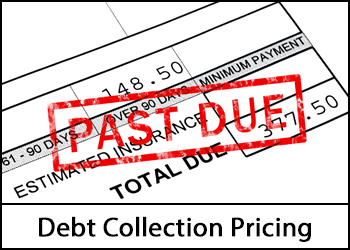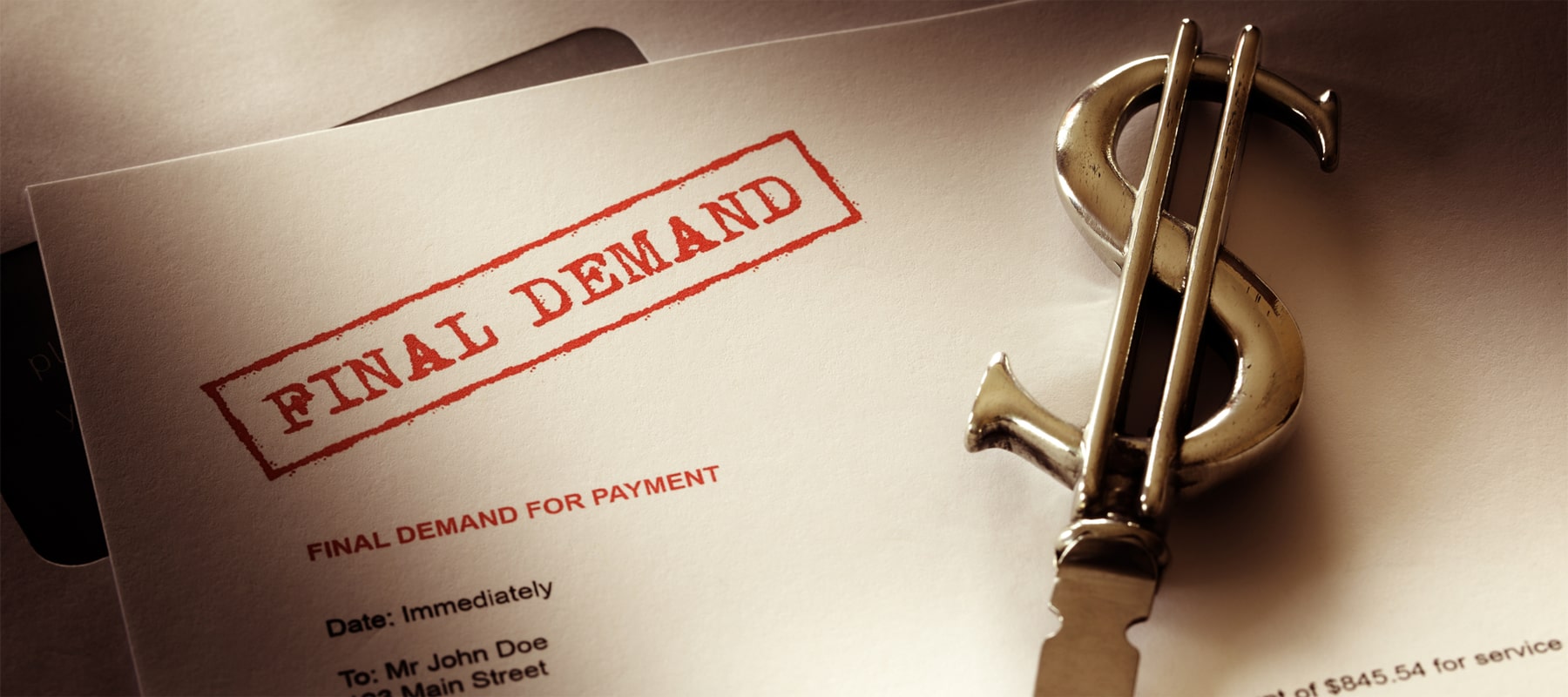How Much Do Collection Agencies Charge?
Last Updated: April 25, 2023

Fact Checked By: Ashley Smith
On This Page
CostOwl.com note: Need a debt collection service at an affordable price? Fill out the 30 second questionnaire below and our debt collection service partners will send you free price quotes.
Quick Summary: Debt Collection Pricing #
Most debt collection companies will charge a 20% to 25% commission of the debt collected. An agency may charge up to 50% commissions if the debt is older or more difficult to collect.

About Debt Collection #
If your invoice letters and calls are going unanswered then it might be time to hire a professional debt collection agency. It's a fact that the longer a debt goes unpaid, the less likely it is that it will ever be recovered.
Professional collectors have systems in place to streamline the debt collection process, leading to better success rates. They have special software and phone systems designed to keep track of how often they're contacting the debtor, ensuring compliance with federal laws. The staff specializes in debt collection strategies and your debtors will take them more seriously. Plus, debt collection can be a plain old hassle, a hassle you may not want to deal with.
Debt collection agencies vary in size and focus. Some are focused on a particular geographic area, while others have clients nationwide. Some specialize in debt collection for specific industries; others are more general in focus.
Debt Collection Agency Average Costs #
The cost of hiring a debt collection agency varies based on the volume of business you provide and the amount of the debts to be collected. Some collection agencies charge a flat fee upfront to take on a fixed number of accounts. But, most take a percentage of the debts they collect, ranging anywhere from 20% to 50%. The older the account, the higher the percentage will be. This is because older debts are harder to collect and tike more of their time to do so.
In addition to a percentage of every debt collected, some collection agencies charge for other costs they incur while collecting your debts. They may charge long distance fees or bill you for the cost of doing a background check on one of your debtors. Be sure to ask for a complete list of fees and rates before settling on any one company.
National vs Local Debt Collection #
National debt collection, also referred to as nationwide debt collection, is the process of collecting defaulted payments and delinquent debts on a local level, but within the boundaries of one country. National debt collection agencies typically specialize in overdue payments. Local debt collection is specific to an area and does not go beyond the confines of a particular geographic location.
The big difference between the two is in licensing. Licensing and regulation for collection agencies to collect commercial debts vary from state to state, and not all national agencies are licensed in a particular state. This can lead to problems if a national company is collecting their debt with a third-party agency; just because the agency is licensed in some states does not mean it can collect in states where it is not.
Why Choose Local? #
More and more consumers are becoming aware of their rights during the debt collections process, which means it is important to hire a properly licensed agency that follows the rules set by the Fair Debt Collection Practices Act (FDCPA). Many states require that debt collection agencies be licensed in that state (or at least bonded) which is not always a guarantee with a national agency. But a reputable, local agency has everything it needs to help collect your debt in the right ways and keep you safe from potential litigation.
Why Choose National? #
Most states have different requirements for debt collection, which can make it difficult to find a collection agency you trust in every state. This might seem unnecessary, but many states have rules that stipulate the collector to be in the same state as the debtor, and if the debtor moves that leaves you without a way to collect. National agencies provide better all-over coverage and allow you to work with a group that you know and trust.
Fair Debt Collection #
Every contract, deal, or commitment will have certain rules that need to be followed and not all of these are things your business may be aware of. Sometimes, personally handling debt collection can mean it's done improperly, potentially landing your business in trouble. A commercial debt collection agency is trained and knowledgeable in the laws the FDCPA has set in order to protect debtors. While you or your business may not know of the benefits and privacy that a debtor is entitled to, a debt collection service will, and follows those guidelines to ensure that no complications arise in the collection process.
Bankruptcy Laws #
There may be times that a person in debt to your business will declare bankruptcy, which may lead businesses performing debt collection in-house to a dead end. A personal debt collector may be unaware of the laws attached to bankruptcy claims or where to go from there, but a commercial debt collection agency understands them. This will also be useful for tax purposes, to show that the business is genuinely trying to recover the money it is owed.
What Are Common Debt Collection Methods? #
Most often, collection agencies communicate with delinquent borrowers via phone calls and letters. If the collector cannot get in contact with the debtor, they may investigate further to determine how to contact the person as well as the debtor's ability to repay the debt.
Collection agencies have the ability to report delinquent debts to credit bureaus, which encourages payment because delinquent debts can wreak havoc on a credit score. However, debt collectors must be paid by the debtor and are unable to take money from a bank account or paycheck directly unless there is a court order, which must be given before the statute of limitations has run out. But even then, the collector still has to request the money from the debtor's bank.
Debt Collection Legitimate Practices #
A reputable collection agency ensures it obtains complete, accurate records to avoid pursuing anyone that doesn't actually owe money to the creditor. If you are contacted about a debt caused by identity theft, the agency will make the effort to have your claim verified. No agency should ever harass or threaten you based on your age, gender, race, or any other factor. Reputable agencies do not try to deceive you in any way to collect a debt and none of them will publicize your debt.
Collection agencies must follow the Fair Debt Collection Practices Act (FDCPA), which limits how they are able to collect a debt and protects consumers from abusive, deceptive, and unfair practices.
A collector should always be fair, honest, and respectful when contacting debtors. If you request a written verification of the debt you have been contacted about, the collector needs to suspend collection activities and supply you with written verification of how much you owe, who you owe it to, and how you need to pay it.
If the debt cannot be verified, the company will stop trying to collect. In the event that the agency is working as a middleman for another creditor, they will let the creditor know that the debt could not be verified.
A collection agency also has the ability to alert credit bureaus that the debt is disputed or request that it be removed from your credit report. They must also operate within specific time limits and cannot send a validation letter later than five days after first contact with a debtor or report on a debt that is older than seven years.
Choosing a Debt Collection Agency #
For successful debt recovery, it is incredibly important that you pick a collection agency that is:
- FDCPA and industry compliant
- A specialist in your industry and the ages, sizes, and types of debts therein
- Nationally or locally bonded, insured, and licensed
- Transparent
When you're considering various debt collection agencies, it's always a good idea to ask for a client list. This will give you an idea of whether the collection agency has experience within your industry and with similarly-sized companies. Make sure the agency is licensed to do business in the state or states where your debtors are located.
Keep in mind that the agency with the lowest rates is not always the best choice. In many cases, you're paying for experience. Larger and more established agencies with a proven success rate are likely to charge more.
Despite the expense, it is worthwhile to hire a collection agency if you're having trouble collecting old debts. Even after the agency takes a percentage, the payment you receive is money that wouldn't have been collected otherwise. It hurts to take a loss. But, it doesn't have to be a total loss.
Resources:
